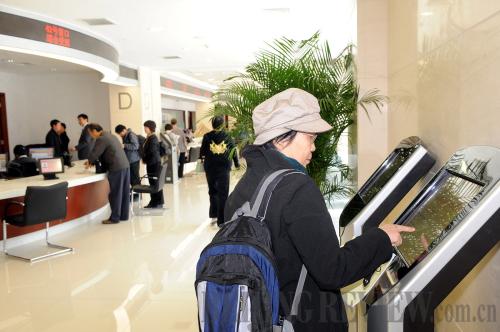|
 |
|
EASY ACCESS: A resident checks information on a self-service machine at an administrative service center in Beijing's Xicheng District on April 18 (ZHANG XU) |
Chu Zhaohui, a researcher with the National Institutes of Educational Sciences, hailed the Ministry of Education's decision to relinquish its power to authorize the compilation of middle school textbooks as progress, yet he said that not enough has been done.
One of Chu's complaints is following the reform, a new textbook still has to be examined and approved by education authorities before its availability in the market. He suggested that textbooks should be examined and approved by an independent agency and that schools and teachers should have the right to choose the textbooks to use. "In this way, the fittest textbooks will survive," he said.
In addition, some administrative approval items have been slashed to promote international exchanges. For instance, foreigners can now enter local nature reserves administered by environmental protection authorities without prior approval. Nor do they need approval for hunting or collecting specimens of terrestrial wild animals not under national protection. Religious schools no longer need approval to hire foreign professionals.
China's current administrative examination and approval system is a product of the planned economy. It has long been blamed for inefficiency and corruption.
Gao Shangquan, Chairman of the China Society of Economic Reform, said that in the summer of 1956, a company in Shanghai sought approval from 11 government departments to install air conditioners. "When the company finally had their applications stamped by all the departments, summer was over," he recalled.
To create a smaller, cleaner, more efficient and services-oriented government, the country began to reform its administrative examination and approval system in 2001.
In 2001, the State Council set up a leading group for administrative examination and approval system reform. Since 2002, experts in such fields as economics, law and public administration have been invited to evaluate the necessity of administrative approval requirements item by item.
The experts finally reached a consensus that nearly 70 percent of existing administrative approval requirements could be slashed.
"After six rounds of reform, the goal has more or less been achieved," said Yu Hui, Director of the Public Policy Research Department of the China Society of Economic Reform.
So far, the Chinese Government has abolished or adjusted approval requirements for 2,497 items, or 69.3 percent of the total, according to the State Council's Administrative Examination and Approval System Reform Office, while local governments have abolished or adjusted requirements for 37,000 items, accounting for 68.2 percent of the total.
Through the reform, the government has reduced direct interference in economic activities, and let the market play a bigger role in allocating economic resources; meanwhile, the government has strengthened macroeconomic control and market regulation, and attached more importance to social management and public service, said officials in charge of the reform.
However, both officials and experts admitted that some administrative approval requirements are still unnecessary and some approval procedures are still prolonged and inefficient.
Yu believes though a majority of existing administrative approval items have been scratched off, the underlying structure of the system remains intact. He said that some controversial administrative approval requirements do not have clear legal basis.
In the future, the government will continue to rescind or adjust administrative approval items according to a principle of reducing and delegating whatever is necessary, said a principal official of the State Council's Administrative Examination and Approval System Reform Office in an interview with Xinhua News Agency.
The government will also strictly examine newly established approval items and promote the use of an electronic supervision system for administrative approval so as to promote transparency, said the official.
Previously, some local governments established requirements without legislative consent. The State Council said in the October 10 statement that new administrative approval requirements can only be set up in accordance with the law and legislative procedures.
On the flip side, removal of administrative approval requirements may create a "vacuum of supervision," the statement said, pledging more effective post-event supervision will be put into place.
The State Council has designated south China's Guangdong Province as a pilot region for the administrative examination and approval system reform during the 12th Five-Year Plan period (2011-15).
During the trial, several items in the region that were previously covered in the system will undergo simplified procedures concerning administrative examination and approval.
Email us at: wanghairong@bjreview.com | 